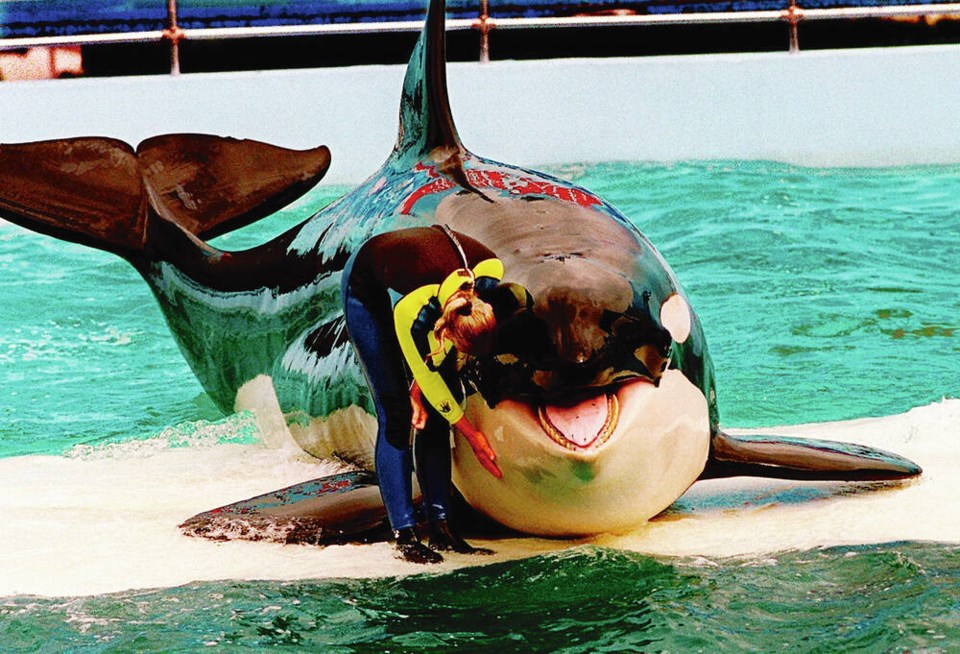Lolita, a southern resident killer whale held captive for more than a half-century, died Friday at the Miami Seaquarium as caregivers prepared to move her from the theme park in the near future.
The Seaquarium posted a statement from the nonprofit group Friends of Toki on social media that Lolita — also known as Tokitae, or Toki — started exhibiting serious signs of discomfort over the past two days. Seaquarium and Friends of Toki medical team members began treating her immediately and aggressively, but the 57-year-old orca died from an apparent renal condition, the statement said.
“Toki was an inspiration to all who had the fortune to hear her story and especially to the Lummi nation that considered her family,” the Friends of Toki statement said. “Those who have had the privilege to spend time with her will forever remember her beautiful spirit.”
The orca was one of 100 herded into Penn Cove off Whidbey Island, Washington, 50 kilometres southeast of Victoria, on Aug. 8, 1970. Seven were captured in nets and taken away to marine parks around the world. All were dead by 1987, except one: a female named Tokitae, later given the stage name Lolita at Miami Seaquarium.
Animal rights activists had been fighting for years to have Lolita freed from her tank at the Miami Seaquarium. The park’s relatively new owner, The Dolphin Company, and the nonprofit Friends of Toki announced a plan in March to possibly move her to a natural sea pen in the Pacific Northwest, with the financial backing of Indianapolis Colts owner Jim Irsay.
“I am heartbroken that Toki has left us,” Irsay said in a statement. “Her story captured my heart, just as it did millions of others. I was honoured to be part of the team working to return her to her indigenous home, and I take solace in knowing that we significantly improved her living conditions this past year. Her spirit and grace have touched so many. Rest in peace, dear Toki.”
Lolita retired from performing last spring as a condition of the park’s new exhibitor’s licence with the U.S. Department of Agriculture. She had not been publicly displayed since. In recent months, new upgrades had been installed to better filter the pool and regulate her water temperature.
Federal and state regulators would have had to approve any plan to move Lolita, and that could have taken months or years. The 2,267-kilogram (5,000-pound) orca had been living for years in a tank that measures 24 metres by 11 metres and is six metres deep.
Susan Berta, co-founder and executive director of the Orca Network in Washington state, said the news of Lolita’s death is difficult to take knowing she was close to finally being released to the wild.
“It’s just really heartbreaking to get so close,” she said.
Berta said the whale had been in better health during the past few months than she had in years, and her death comes as a surprise.
On Thursday, all three pods of southern resident killer whales gathered off the San Juan Islands and Lolita’s direct family was still in the area on Friday, as if there to welcome her spirit home, Berta said.
“So she is home, not the way we wanted, but I really feel like they knew that. And that she is home swimming with them, free of that little tank finally. And that’s what I’m holding in my heart to make it easier,” Berta said.
Eric Pittman, director of the Canadian Orca Rescue Society in Victoria, said Lolita’s death made him angry and frustrated.
“There were so many opportunities to get her out. And they worked her to death,” he said.
He hopes heartbreak over Lolita’s death helps to fuel efforts to release Corky, the oldest orca in captivity, into the wild from SeaWorld in San Diego.
“It’s hard enough watching one of our orcas die in captivity. Let’s not watch the next ones die in captivity,” he said.

